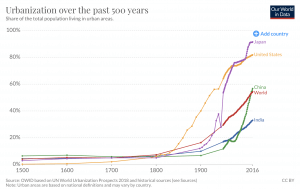Collaboration in the Face of a Pandemic
It’s clear that Covid 19 has shifted the entire world into a new place. The way that we work, travel (or don’t) and live has been irrevocably shaken, with everyone asking what can be done to combat this pandemic.
The speed at which the coronavirus has struck populations internationally has surprised authorities significantly. The lack of understanding about the dangers of the virus and its virility – and supporting data – has meant that communities have been slow to act and instigate plans across local and international borders.
Today, half the world’s population resides in urban environments, with that rising to two-thirds by 2050. It’s becoming clearer that the frontline of the fight against this and future pandemics is in our cities. Making these public health crises even more damaging is the inequalities and geographical claustrophobia that we see in urban areas around the world.

During times of deep crisis, cities need to work together as a community, to collaborate, to innovate, to help and to support each other. After all, the reason people move to cities is not to be isolated, but to be a part of something larger than oneself.
What’s clear, is that this is the time for unity. Unity in business, government, communities, countries – everything. But how can collaboration be best utilised to reduce the impact of this pandemic and those that may occur in the future?
Collaboration vs Isolation
While the headlines might be focusing on hand sanitiser sales, singing from balconies and government responses, what we’ve learnt already over this short time frame is that cities that have a strong medical infrastructure, commanding governance and contingency plans to act fast have greater preparedness. It may seem obvious to some, but the speed at which pandemic procedures including social-isolation, testing and screening of the population, locking down of borders are implemented determines how rapidly and effectively cities can stave off the illness.
Looking at Singapore, who with recent memories of the SARS outbreak, executed its plan quickly, with the population obliging fully. There, the cases have stagnated, with a little number of deaths even though it has a high population density and is a centre for international commercial and transport.
It’s this preparedness-readiness that other cities and countries should examine and collaborate on, with Georgetown University explaining that municipal authorities and mayors are often left out high-level plans to prepare for pandemics.
“Municipal leaders and stakeholders will be responsible for much of the management of an outbreak – such as quarantine, access to care, distribution of medical countermeasures, and first responders”
In the face of pandemics, communities need to be galvanised to do their part, to support and to abide by warnings. The best way to achieve this? Openness. Openness about how and why authorities are taking severe measures and how it affects the population.
Another key enabler of quick responses has been highlighted in Korea, China and Singapore, where data-sharing has enabled health services to react and tell communities how to act to stem the spread. It’s here that the openness of data plays a key role. Health services need these datasets that, when worked on alongside millions of other data points, can spot patterns that have the potential to save lives. Whilst there have been calls of data being used to cover up whistleblowing in China, there needs to be a middle ground where health services can react and guide with greater knowledge at their fingertips. This has been provisioned in GDPR legislation, where it can be suspended due to a public health emergency.
It should be the job of all cities to understand how they prepare and execute it intuitively amongst their citizens. Working on urban pandemic preparedness means a more resilient city in more ways than one. Calls are now being made for Mayors around the world to participate in the ‘Rapid Urban Health Security Assessment (RUHSA) Tool’ for greater international alignment on pandemic protocols.
“Cities that are open, transparent, collaborative and adopt comprehensive responses are better equipped to manage pandemics than those that are not.”
Moreover, city officials should be encouraging better data collection amongst the key city services to help provide an overall and ever-evolving picture of the situation, encouraging data-led decision making. In the form of more robust City Datastores, expertise from the private sector can assist in utilising data, whilst the city fosters an environment of collaboration. This partnership may lead to greater openness between the private and public sector with both being able to assist in emergency scenarios.
What we’ve come to understand is that cities cannot prepare all these measures alone, this process requires innovation in communication, medicine and logistics to make protocols work effectively. For this, greater collaboration needs to happen between public and private sectors to assist in times of great emergency.
Public and Private Sectors: Unified
This crisis is a matter of a challenge creating opportunities for everyone to work together.
There have been some stopgap approaches from the private sector to affect the pandemic including LVMH repurposing perfume factories in France to create sanitising gel and Decathlon partnering with 3D printing firm Isinnova to retrofit scuba masks as emergency C-PAP ventilators, however these are only short-term, charitable measures. In order to create lasting change and to stop this virus and future pandemics, more must be done.
In South Korea, the Corona 100m app was launched by a Biotech executive – Bae Won-Seok, which tells subsects of the population when they may have come into 100 metre contact with an infected person. It utilises open government testing data and gives citizens the information they need to make the right decisions. Whilst this solution hinges on the ability to widely test, it has proven very effective at flattening the curve there and mitigating the economic and social damage that pandemics cause by identifying and isolating the sick. With open data, technological solutions from the private sector can help – it is a matter of closer collaboration.
For many private sector organisations helping improve the financial and economic situation is in their best interest. For startups in particular, the hope of investment in the near future will mostly come from public sector grants, with investors and Venture Capitalists largely freezing funds or in certain cases behaving badly, striking unfair deals with young ventures grasping for capital during this difficult time. Adapting to the situation will see business rise and fall during this crisis. It is therefore about identifying and understanding how they can help. We’re already seeing the rise of focused funds dedicated to investing in solutions that combat the pandemic, like OpenAI.
Grant funding is also being released to work with innovators to help support in this fight. A Horizon 2020 grant for SMEs was promoted heavily last week for this exact reason. At the time of writing NHSX has released a call to innovators to help face the challenge of Covid 19 and help the vulnerable, the elderly and the self-isolated.
This is a fantastic first step, but more needs to be done to engage the nation as a whole. The challenges that need to be solved now, have to be opened up for collaboration for the greater good of society as we know it. Much like the international scientific community, who have broken down the silos of traditional research and development and started to collaborate with teams around the world. For them, this is total war, with all other research put on hold so they can all work on vaccines and learn more about Covid 19. Collaboration is key.
This latest pandemic flies in the face of all that cities stand for. Social distancing is the antithesis of cities, it’s very important we work out how to work together for the good of urban environments and human-kind as a whole. Collaboration is the key, amongst citizens, governments, companies, countries – everyone.
We must look now within ourselves to see how we can help each other. Necessity is the mother of all invention, so let’s allow ourselves to be open to the ideas of others, to work and support each other for this crisis and for any crisis in the future.

